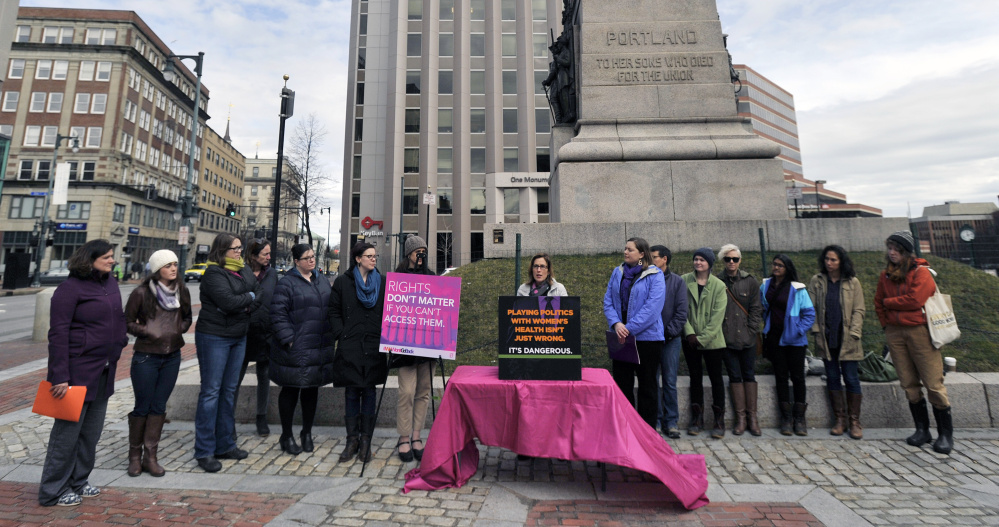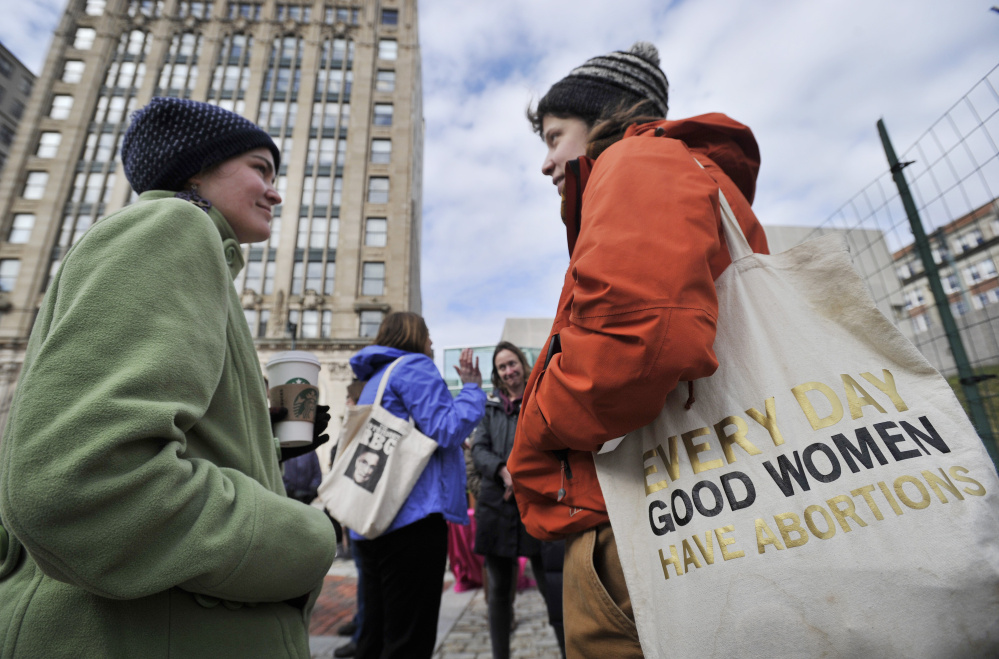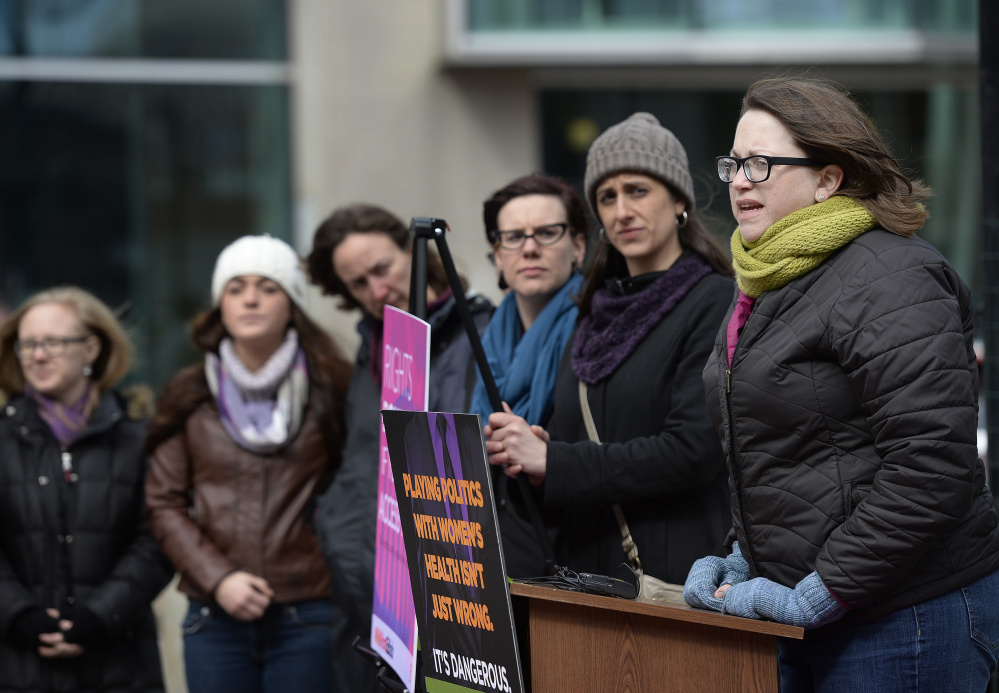WASHINGTON — The Supreme Court appeared sharply divided Wednesday over Texas abortion clinic regulations in its biggest abortion case in nearly a quarter-century.
In Portland, Maine, abortion rights supporters held a rally in Monument Square across the street from Planned Parenthood’s office on Congress Street after justices in Washington heard arguments in the case.
A bill defeated in the Maine Legislature last year would have created a law similar to the one in Texas, which created new rules for both abortion providers and clinics that critics contend are burdensome to women, said Kate Brogan, vice president of Augusta-based Maine Family Planning.
Supporters of the rules say they are meant to protect women’s health.
“If the Supreme Court rules that this law is legitimate, we’ll see this over and over again,” Brogan said. “When they say it’s about women’s safety, it’s just not true. It’s about closing clinics.”
Justices will decide whether Texas regulations that require abortion clinics to meet hospital-like standards and force doctors to get special privileges at local hospitals are medically necessary or an unconstitutional burden on a woman’s right to an abortion.
In 90 minutes of intense arguments, the court’s liberals and conservatives staked out expected positions.
Justice Anthony Kennedy, whom both sides consider pivotal to the outcome of the case, wondered whether it was possible to tell whether it is the 2013 changes in the Texas law that forced the closure of nearly half the state’s abortion clinics, The Washington Post reported. He wondered if lower courts might need to hear more evidence.
But he also seemed not to accept Texas’ argument that the state’s intent in passing the law should not be considered, and wondered whether the restrictions were forcing women into abortions later in their pregnancies which might be more risky. Both of those assertions were made by the abortion providers. The justice appeared concerned that one effect of the 2013 law is that it has lowered the number of abortions resulting from women taking pills and increased the number of more invasive surgical abortions, which he said “may not be medically wise,” the Post reported.
At the rally in Portland, about 15 women stood together with signs at a noon news conference and announced their plan to stay until 6 p.m. to raise awareness about the impact the Supreme Court’s ruling could have in Maine.
“If the Texas clinic shutdown law is upheld, it could create a world where even though abortion is legal, it is completely out of reach for many women,” said Nicole Clegg, spokeswoman for Planned Parenthood of Northern New England.
‘A RIGHT WITHOUT ACCESS IS NO RIGHT’
Alison Beyea, executive director of the American Civil Liberties Union of Maine, referred to laws like the one in Texas as “sham laws” designed to punish and shame women.
“Abortion is a constitutionally protected right. But a right without access is no right at all,” Beyea said.
Other speakers at the rally included Andrea Irwin, executive director of the Mabel Wadsworth Women’s Health Center in Bangor; and Eliza Townsend, executive director of the Maine Women’s Lobby.
The Supreme Court hearing took place in the middle of a raucous presidential campaign and less than three weeks after the death of Justice Antonin Scalia, an outspoken opponent of abortion rights.
Other than Kennedy, justices on both sides of the ideological divide posed pointed questions that seemed to leave little doubt where they stood concerning the regulations. The rules require doctors who perform abortions to have admitting privileges at nearby hospitals and they force clinics to meet hospital-like standards for outpatient surgery. The court put the surgery center requirement on hold while it considers the case.
Justice Ruth Bader Ginsburg and the other liberal justices repeatedly asked Texas Solicitor General Scott Keller to justify the need for more stringent regulations that the clinics say have led to the closure of roughly half of the 40 or so clinics in operation before the law took effect. Only about 10 clinics would remain in Texas if the law takes full effect, both sides agree.
WERE CLINIC CLOSURES TIED TO NEW RULES?
Ginsburg questioned whether Texas had evidence that existing state law “was not sufficiently protective of women’s health.” She said abortion is safer than many other medical procedures that are not as strictly regulated.
Keller replied that more than 210 women had to be hospitalized as a result of complications from abortions in a recent year. Pressed by Ginsburg, Keller acknowledged that was a complication rate of less than 1 percent of the state’s 70,000 abortions, but said the state still could act to make abortion safer.
Sitting next to Ginsburg, Justice Samuel Alito pressed the clinics’ lawyer, Stephanie Toti, to cite evidence showing that the regulations have had the drastic effect she claimed. Both Alito and Chief Justice John Roberts questioned whether some clinics closed for reasons independent of the regulations.
“What evidence is there that ties the closures to the requirements?” Roberts asked.
If the court is evenly divided, the justices could decide to rehear the case once a new colleague joins them. President Obama says he will nominate a successor to Scalia. But Senate Republicans, backed by the party’s presidential candidates, have pledged to keep Scalia’s seat empty so that the next president can fill it after taking office in January 2017.
Staff Writer Scott Dolan and The Washington Post contributed to this report.
Send questions/comments to the editors.





Success. Please wait for the page to reload. If the page does not reload within 5 seconds, please refresh the page.
Enter your email and password to access comments.
Hi, to comment on stories you must . This profile is in addition to your subscription and website login.
Already have a commenting profile? .
Invalid username/password.
Please check your email to confirm and complete your registration.
Only subscribers are eligible to post comments. Please subscribe or login first for digital access. Here’s why.
Use the form below to reset your password. When you've submitted your account email, we will send an email with a reset code.